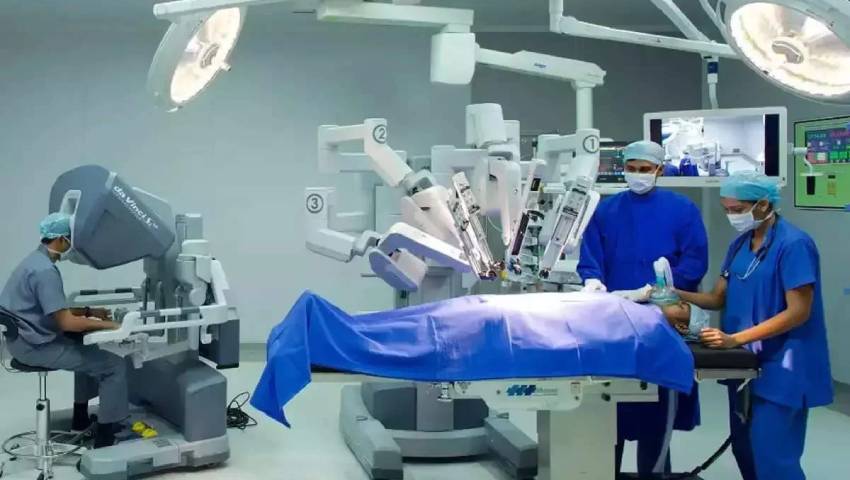
Robotic surgery is transforming the way we approach healthcare for our digestive systems. With a focus on perfection and minimally invasive methods, it’s increasingly popular for complex procedures. In India, about 30% of complicated surgeries are now performed using robotic systems, marking a significant step in surgical practices. Dr. Arun Nair, a leading gastroenterologist in Thrissur, utilizes this technology to give safer and more effective treatments for gastrointestinal conditions. This blog explores the impact of robotic surgery on the future of gastrointestinal healthcare and its promising advancements.
What is Robotic Surgery?
Robotic surgery is a cutting-edge surgical system where surgeons use developed robotic systems to support performing operations. Instead of manually handling instruments, the surgeon controls robotic arms from a console, allowing for higher perfection, flexibility, and control. This technology includes high-definition 3D imaging and tools that can make lower, more accurate movements than human hands, making it ideal for complicated and delicate procedures like those needed in gastrointestinal( GI) surgery.
Benefits of Robotic Surgery for Gastrointestinal Procedures:
Robotic surgery offers significant advantages for gastrointestinal procedures:
- Improved Precision: Robotic systems allow surgeons to operate more accurately, reducing the threat of harming surrounding tissues or organs.
- Smaller incision: Robotic-assisted procedures are minimally invasive, which means smaller incisions, minor scarring, and faster recovery times.
- Reduced Pain: Smaller lacerations and more precise movements generally result in less postoperative pain, allowing patients to recover more comfortably.
- Faster Recovery: With reduced pain and smaller slits, patients frequently witness hastily reclamation times, which means shorter hospital stays and a quick return to day-to-day activities.
- Improved Visualization: The 3D imaging provided by robotic systems gives surgeons a magnified prospect of the surgical area, perfecting their capability to know and address the conclusion with better clarity.
- Fewer Complications: Minimally invasive procedures reduce the threat of complications similar to infections or blood loss, leading to safer outcomes for patients.
The Impact of Robotic Surgery on Gastrointestinal Healthcare:
The impact of robotic surgery on gastrointestinal healthcare is profound and multifaceted:
- Improved Patient Outcomes: Enhanced precision and minimally invasive methods improve surgical success and reclamation rates.
- Expanded Treatment Options: Robotic surgery enables the performance of complex procedures that may have been too dangerous with traditional techniques, providing more patients with effective treatment options.
- Increased Access to Care: As robotic systems become more extensively espoused, further healthcare facilities can offer improved surgical options, allowing patients in different geographic areas to profit from cutting-edge technology.
- Enhanced Surgical Training: Robotic systems provide chances for surgical training and simulation, helping to develop the skills of the coming generation of surgeons.
- Cost-Effectiveness: Although the initial investment in robotic technology can be high, long-term advantages include shorter hospital stays and fewer complications, potentially reducing overall healthcare costs.
- Greater Patient Satisfaction: With faster reclamation times and less postoperative discomfort, patients frequently report higher satisfaction with their surgical experiences
- Advancements in Research: The integration of robotic surgery into gastrointestinal procedures opens avenues for research and invention, leading to nonstop advancements in surgical ways and patient care.
The Future of Gastrointestinal Healthcare:
As robotic technology continues to develop, it’s expected to play a transformative part in the future of gastrointestinal healthcare. The ability to perform complicated procedures with less trouble, reduced recovery times, and bettered perfection will benefit both patients and healthcare providers. Inventions in robotic surgery may conduct new surgical ways, allowing further patients to qualify for minimally invasive treatments. As this field grows, specialists like Dr. Arun Nair, who is trained in robotic surgery, will be pivotal players in shaping the future of gastrointestinal treatments.
In conclusion, robotic surgery is revolutionizing gastrointestinal healthcare, offering safer and more effective treatments with quicker reclamations. For expert care, turn to Dr. Arun Nair, a leading robotic surgeon in Thrissur who specializes in this developed technique. With his expansive experience and cutting-edge technology, you can expect personalized and operative treatment options. Book an appointment with Dr. Arun Nair today and take the first step toward better gastrointestinal health!
Recent News

5 Early Signs of Liver Damage
8th January 2025
The Differences Between Crohn’s and Ulcerative
21st December 2024
Diagnosed with IBD? Here’s What You
10th December 2024
Gallbladder Stone Treatment Pros and Cons
21st November 2024
7 Silent Signs You Have A
24th October 2024
How To Know If Laser Surgery
13th October 2024
The Impact of Robotic Surgery on
30th September 2024
Understanding Piles Recurrence Why Do Hemorrhoids
14th September 2024
15 Reasons Why you Should choose
29th August 2024
When is Constipation an Emergency?
21st August 2024Contact info
1ST FLOOR ZABS FORT building, Civil Lane Road, Poothole P.O, Thrissur, Kerala 680004
Church Post Office Road near Parumala, Thiruvalla, Kerala 689626
+91-9539988886
drarungastrosurgeon@gmail.com
St. Gregorios Hospital, Thiruvalla
The Gastro Clinic(Elixir Clinic), Thrissur
© 2024 Dr Arun Gastro Surgeon All rights reserved


